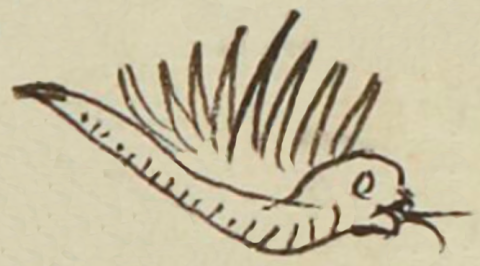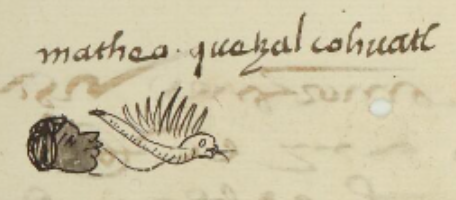Quetzalcoatl (MH538r)
This black-line drawing of the compound glyph for the personal name Quetzalcoatl ("Feathered Serpent") is attested here as a man's name. If the spelling of the deity name is really Quetzalcohuatl, then the serpent is a phonetic indicator, and it has no real place in the translation.
Stephanie Wood
Quetzalcoatl seems a rare and lofty name for an average child of an agricultural community, but perhaps the parents were special devotees of this divine force or deity. See the Mexicolore article about Quetzalcoatl for more information.
Feathered (or "plumed") serpents are known in Mesoamerican art from at least the Olmec period forward to the Spanish colonial period. A short article about Quetzalcoatl in Mexicolore includes this text about the post-Classic period: "The Toltecs lived in the City of Tula (near Mexico City) in the early Postclassic period (900-1200AD). They predated the Aztecs and perhaps even battled with them towards the end of Tula’s cultural and economic dominance in Mesoamerica. They are widely perceived to have spread an active cult of Quetzalcoatl as far south as El Salvador. Parallel to this historic account of Toltec civilization, the Aztecs recorded the myth that the Toltecs were led by a charismatic priest, Ce Acatl Topiltzin Quetzalcoatl (1 Reed Our Lord Quetzalcoatl) (pic 3). Entwined in the annals of history, both god and historical figure became one. Legend says that Ce Acatl Topiltzin and the Toltecs left Tula after being tricked and shamed by Quetzalcoatl’s brother, the deity Tezcatlipoca. They travelled past Cholula (in Puebla), into the Yucatan and Chichén Itzá, and may even have gone as far as El Salvador. Whether the historical figure of Ce Acatl Topiltzin did this, or whether it was the deity Feathered Serpent, we know that Quetzalcoatl was worshipped throughout Mesoamerica up until the conquest in 1521, and that the Aztecs appeared to combine Quetzalcoatl the priest with the deity."
1560
Jeff Haskett-Wood
serpientes emplumados, quetzales, plumas, nombres de hombres

Quetzalcoatl, deity, https://nahuatl.wired-humanities.org/content/quetzalcoatl
quetzal(li), feathers, https://nahuatl.wired-humanities.org/content/quetzalli
coa(tl), serpent, snake, https://nahuatl.wired-humanities.org/content/coatl
Serpiente Emplumado
Stephanie Wood
Matrícula de Huexotzinco, folio 538r, https://www.loc.gov/resource/gdcwdl.wdl_15282/?sp=155&st=image
This manuscript is hosted by the Library of Congress and the World Digital Library; used here with the Creative Commons, “Attribution-NonCommercial-ShareAlike 3.0 License” (CC-BY-NC-SAq 3.0).






